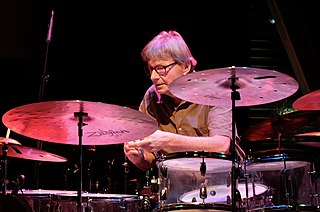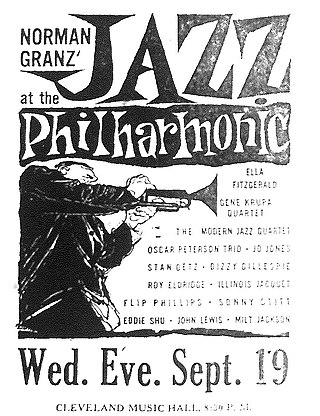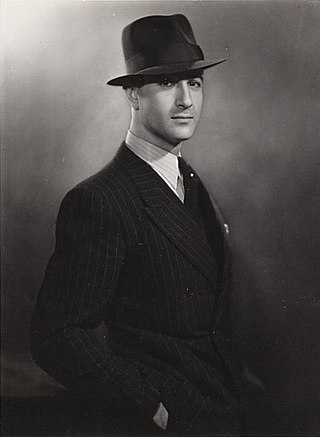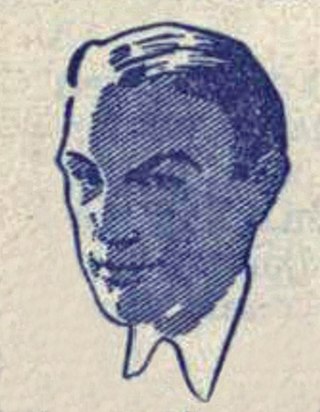This article needs additional citations for verification .(September 2024) |
Dutch jazz refers to the jazz music of the Netherlands. The Dutch traditionally have a vibrant jazz scene as shown by the North Sea Jazz Festival as well as other venues.
This article needs additional citations for verification .(September 2024) |
Dutch jazz refers to the jazz music of the Netherlands. The Dutch traditionally have a vibrant jazz scene as shown by the North Sea Jazz Festival as well as other venues.
In the Netherlands jazz began around 1919 to 1921. In the early thirties Paul Whiteman and Duke Ellington would perform in the nation sparking further interest. By the late 1930s the Dutch jazz group The Ramblers performed with Coleman Hawkins among others. The AVRO employed the Dutch Dick Willebrandts between 1937 and 1940 as a pianist with the AVRO Dance Orchestra the bandleader of which was the clarinetist Hans Mossel. [1] [2] [3] Willebrandts also wrote arrangements for the AVRO Dance Orchestra.
Still there was some discomfort with the jazz clubs and fear the musicians would be corrupting on Dutch women. In addition to that the staffs were often Surinamese and racial aspects came into play at times. The clubs also had Surinamese musicians like Teddy Cotton.
At first jazz in the Netherlands was not curtailed by Nazi Germany's occupation. In 1940 the US was not yet at war with Germany so the music was given a degree of freedom. Still restrictions on Jewish musicians had some effect and caused the Ramblers to fire several musicians. In some cases, however, Dutch jazz musicians aided Nazi propaganda at this point.
In March 1941 the Nazis took over the control of the Dutch radio and the AVRO Dance Orchestra was forced to disband. However, Willebrandts was able to continue to perform for the Dutch radio. In 1942 he was able to form a big band, Dick Willebrandts and His Dance Orchestra, which became one of the most popular jazz big bands in the Netherlands. Recordings were made by Decca Records, the label who also sponsored his concert tours in the Netherlands.
The situation began to deteriorate in 1941 as the war with the Soviet Union and then the United States led to restrictions. At first this limited them to performing in theatres and prohibited English-language names for bands. In time groups were forbidden to use the word "jazz" and restrictions grew severe. In some cases musicians adjusted by switching to Polynesian music, but in the case of Jewish musicians life became perilous. Later there would also be repressions of the Surinamese jazz musicians for being "Non-Aryan".
Dutch jazz musicians had reflected Americans before the war and this continued to varying degrees until the late 1950s. In the 1970s jazz gained acceptance in Rotterdam, Amsterdam, and government funding. Since then many jazz musicians choose the Netherlands as a place to study or settle. Examples of this include Sean Bergin, Cab Kaye, Wilbur Little, and Michael Moore.
Dutch jazz includes various styles although avant garde and European free jazz has been significant in the last few decades. In addition to that trad jazz and smooth jazz, the latter perhaps exemplified by Candy Dulfer, also has many adherents. The Netherlands is also home to Stochelo Rosenberg, one of the leading living figures in Gypsy jazz.
The VPRO/Boy Edgar Award is a jazz award from the Netherlands. This prize is given to an individual that must have made significant contributions to the Dutch jazz scene over a significant period of time. In 2008 the prize was given to Pierre Courbois.

Pierre Courbois is a Dutch jazz drummer, bandleader, and composer.

This is a timeline documenting events of Jazz in the year 1963.

This is a timeline documenting events of Jazz in the year 1969.

This is a timeline documenting events of Jazz in the year 1978.

This is a timeline documenting events of Jazz in the year 1998.

This is a timeline documenting events of Jazz in the year 1980.

This is a timeline documenting events of Jazz in the year 1981.
This is a timeline documenting events of Jazz in the year 1940.

This is a timeline documenting events of Jazz in the year 1955.

This is a timeline documenting events of Jazz in the year 1956.

Danish jazz dates back to 1923 when Valdemar Eiberg formed a jazz orchestra and recorded what are thought to be the first Danish jazz records in August 1924. However, jazz in Denmark is typically first dated to 1925, when bandleader Sam Wooding toured in Copenhagen with an orchestra. This was the first time most Danes had heard jazz music. Some prominent early Danish jazz musicians include Erik Tuxen who formed a jazz band and was later named conductor of the Danish Radio Symphony Orchestra; Bernhard Christensen, an art music composer who incorporated jazz elements into his pieces, and Sven Møller Kristensen, who was the lyricist for many of Bernhard Christensen's pieces and who wrote a book on jazz theory in Danish.

This is a timeline documenting events of Jazz in the year 1915.

This is a timeline documenting events of Jazz in the year 1947.

This is a timeline documenting events of Jazz in the year 1930.

This is a timeline documenting events of Jazz in the year 1921.

This is a timeline documenting events of Jazz in the year 1939.
This is a timeline documenting events of Jazz in the year 1911.
This is a timeline documenting events of Jazz in the year 1904.

Henri Emile "Hans" Mossel was a Dutch clarinetist and saxophonist.

Dick Abraham Willebrandts was a Dutch pianist, composer and bandleader in the swing era.
{{cite web}}: CS1 maint: archived copy as title (link)